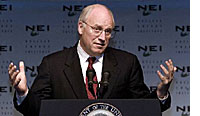
When a new president takes office, high-ranking officials appointed by the previous administration are usually replaced as quickly as possible. That was certainly the case with the Bush administration, which wasted little time in accepting the resignations of each of the 37 officials who served as undersecretaries for Bill Clinton — except one.
The lone survivor of the political housecleaning was Alan Larson, who continues to serve in the State Department as undersecretary of state for economic affairs. The exception is particularly notable, observers say, given that Bush demands absolute loyalty from his appointees. “It’s unusual,” notes Paul Light, who studies presidential appointments for the Brookings Institution, a Washington-based think tank. “Undersecretary positions are very high-ranking plums. You generally would use them to reward someone who is faithful to the president and to no previous administration.”
But Undersecretary Larson, as it happens, may have had a chance to demonstrate his faithfulness even before Bush was elected president. In February 2000, Larson received a visit from Dick Cheney, then the CEO of Halliburton. According to a source familiar with the meeting, Cheney wanted to express concern over a State Department decision to block $500 million in federal loan guarantees to a Russian company called Tyumen Oil. Larson was responsible for the issue at State. Sources say the State Department had blocked the aid after the CIA warned that Tyumen and its owners, a Russian conglomerate called the Alfa Group, were suspected of tampering with courts to stage hostile takeovers of rival companies. BP Amoco and other investors in one of those rivals had also lodged complaints, accusing Tyumen of driving the firm into bankruptcy and attempting to steal its assets in a rigged auction.
The decision to block the deal was bad news for Cheney, since Tyumen was supposed to pass along nearly $300 million of the federal subsidies to Halliburton to help refurbish a Siberian oil field. So at his meeting with Larson, Cheney warned that refusing the aid to Tyumen might cost jobs at Halliburton.
Cheney got his way. Two months after he met with Larson, the State Department withdrew its objections and agreed to release the money. When Bush and Cheney moved into the White House the following January, Larson kept his job.
In deciding to keep Larson, a career Foreign Service official, the State Department says that “questions of loans, contracts, or individual companies were never raised nor even considered.” Insiders say Larson is now considered something of a rising star in the administration. In October, he was sent on high-profile missions to Saudi Arabia and other oil-supply nations to secure a commitment for increased production should Iraq’s oil taps get turned off because of war.
The fortunes of Tyumen and its parent company have likewise soared. Last summer the administration signed a deal with the Alfa Group to explore a series of oil projects in Russia. And in October, not long after Cheney suggested allowing Russian companies to supply the United States with oil, Tyumen became the first Russian firm to deliver oil to the Strategic Petroleum Reserve, providing the federal government with 285,000 barrels.












